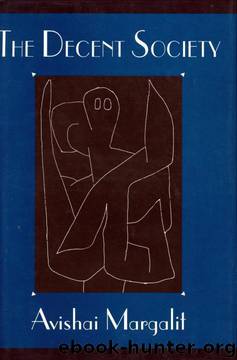The Decent Society by Avishai Margalit

Author:Avishai Margalit
Language: eng
Format: epub
Published: 2011-08-05T06:05:00+00:00
Since a decent society involves respect for humans, and humiliating any human being is wrong, no distinction should be made in this regard between members of the society and people in its orbit who are not members. It is for this reason that I do not define the decent society as one that does not humiliate its members, but extend the concept to include anyone under its jurisdiction.
The notion of jurisdiction needs to be clarified. Dutch society, as a system including only its citizens in The Netherlands, was a decent society, or close to being so, at the time when the country was a colonial power. It was not a decent society, however, to the people it ruled in Indonesia, and it was therefore disqualified from being considered a decent society in general. Colonial societies must be judged not only by how their institutions treat their citizens at home but also by how they treat their subjects in the colonies.
When a society is an encompassing group, we may then ask how this society treats its members. This is a narrower question than the previous one, which asked how the society treats all its dependents, both members and non members. The present question is what it means to belong to that society and how this belonging is reflected in the way the society's institutions treat its members. One very important question for determining if' the society is a decent one is the question of whether it rejects the membership of' those who are supposed to belong to it. The last question is not confined solely, or even primarily, to the issue of formal acceptance in the society, but refers to it broader sense of belonging to it.
A natural setting for discussing the issue of the decent society is the nation-state. On the whole, a nation-state fulfills the function of an encompassing group for its citizens. By restricting the discussion to nation-states I am not limiting its generality, since the principles we will be discussing can be extended to social settings that do not constitute nation-states.
My first claim is that it decent society does not injure the civic honor of' those belonging to it. A more familiar version of' this claim is that in it decent society there are no second-class citizens. In ancient Rome citizens enjoyed special public privileges, such as voting at assemblies, army service, the right to hold public office, and the legal right to site and to defend themselves against suits. There were also private rights in Rome, such as the right to get married and to do business, but it crucial distinction was made between public and private rights. During a certain period the Romans offered the Latin nations they had conquered citizenship without public rights. Indeed, some of the battles between Rome and its neighbors in Italy were over the extent of the citizenship that should be granted to foreigners. The Roman notion of second-class citizenship meant citizenship without voting rights.
My reason for describing second-class citizenship
Download
This site does not store any files on its server. We only index and link to content provided by other sites. Please contact the content providers to delete copyright contents if any and email us, we'll remove relevant links or contents immediately.
The Secret History by Donna Tartt(19086)
The Social Justice Warrior Handbook by Lisa De Pasquale(12190)
Thirteen Reasons Why by Jay Asher(8909)
This Is How You Lose Her by Junot Diaz(6886)
Weapons of Math Destruction by Cathy O'Neil(6279)
Zero to One by Peter Thiel(5801)
Beartown by Fredrik Backman(5754)
The Myth of the Strong Leader by Archie Brown(5507)
The Fire Next Time by James Baldwin(5442)
How Democracies Die by Steven Levitsky & Daniel Ziblatt(5218)
Promise Me, Dad by Joe Biden(5153)
Stone's Rules by Roger Stone(5087)
A Higher Loyalty: Truth, Lies, and Leadership by James Comey(4960)
100 Deadly Skills by Clint Emerson(4925)
Rise and Kill First by Ronen Bergman(4788)
Secrecy World by Jake Bernstein(4752)
The David Icke Guide to the Global Conspiracy (and how to end it) by David Icke(4717)
The Farm by Tom Rob Smith(4507)
The Doomsday Machine by Daniel Ellsberg(4490)
